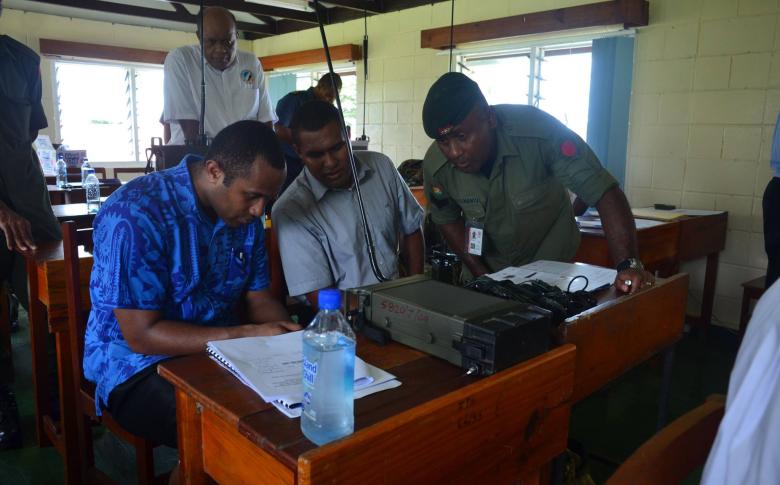WFP, RFMF, Navy And NDMO Host Training In Suva To Boost Radio Lifelines In Emergencies

SUVA – The United Nations World Food Programme (WFP), in its role as lead of the Pacific Emergency Telecommunications Cluster (ETC), has joined with the Fiji National Disaster Management Office (NDMO) to support a High Frequency Radio Communication System training course. High Frequency (HF) radio is a technology that provides backup communications capability during emergencies when other communication systems may be down.
“The three-day training course, conducted by the Republic of Fiji Military Forces (RFMF) and The Republic of Fiji Navy, was designed to complement the recent upgrade by the Pacific Emergency Telecommunications Cluster of the HF radio communication system for the Fiji NDMO.
This training is the vital next step to the work that has gone into revitalising key sites in the NDMO’s emergency communications network,” said Salma Farouque, WFP Pacific Emergency Telecommunications Coordinator. “Collaborating with the navy and the military, which have extensive capabilities in HF radio communications and are willing to share their knowledge, will greatly benefit operational staff in the District Offices from the four Divisions.”
The training, which took place at the Queen Elizabeth Barracks from 10th – 12th April, 2017, targeted NDMO staff from District Offices and with approximately twenty-five people in attendance from around the country, included representation from all four Divisions. The training focused on HF radio communications with a basic training component on satellite communications. Practical field exercises, which formed part of the training, provided participants with hands-on experience in using HF radio systems.
“Having reliable backup channels of communications such as this HF Radio network can be instrumental in delivering life-saving assistance and aid during disasters,” said Meleti Bainimarama, Fiji’s Permanent Secretary for the Ministry of Rural and Maritime Development and National Disaster Management. “Training ensures that local disaster management practitioners are equipped and ensures the sustainability of investment into emergency communications. I look forward to seeing the hard work invested during this training exercise bear fruit, and WFP must be saluted for their continuous partnership with Government in the arena of disaster management.”
In line with its global mandate and obligations as the head of the humanitarian clusters for emergency logistics, telecommunications and food security, WFP established a technical presence in the Pacific in late 2015 to assist regional governments with their emergency preparedness measures, and to enhance their capacity to assist people in need.
This support is coordinated through WFP’s office in Fiji. The regional programme focuses on assisting five priority Pacific Island nations, Fiji, Samoa, Vanuatu, Tonga and the Solomon Islands, with plans underway to expand support into Northern Pacific Island States.
# # #
WFP is the world's largest humanitarian agency fighting hunger worldwide, delivering food assistance in emergencies and working with communities to improve nutrition and build resilience. Each year, WFP assists some 80 million people in around 80 countries.
Follow us on Twitter @wfp_media | @wfp_asia | @ITresponse
# # #
The Ministry of Rural and Maritime Development and National Disaster Management coordinates and implements the Fijian Government’s rural and maritime development initiatives with a mission to empower Fiji’s rural sector. It is also responsible for the national disaster management strategy focusing on building resilient communities with offices in each of Fiji’s 14 provinces leading the Fijian Government’s rural development and disaster management operations. For more information about the Ministry and its work visit: www.ruraldev.gov.fj.
Follow us on Twitter @FijiGov_MRMDNDM | Facebook: @developmentfiji
For more information please contact (email address: firstname.lastname@wfp.org):
Sanya Ruggiero, WFP/Fiji, Tel. +679 8666 445, sanya.ruggiero@wfp.org
Penioni Kuinikoro, NDMO, Tel. +679 7666 415, penioni.kuinikoro@govnet.gov.fj
Originally appeared on WFP.org